A JOURNEY TO SANTIAGO - SAINT JACQUES DE COMPOSTELLE A PILGRIM’S PROGRESS
Lynne Burney Yashoda
Part 3 - Anglais / Français (version française plus bas)
This story begins just before Easter in the year 2000. It spans 4 years and 3 seasons. As I tell the story I will pause to ask you, the reader or listener, a question which you may choose to answer or share it with others.
You will notice that I refer to this journey alternatively as le chemin de Saint Jacques, the Way of Saint James, El Camino or sometimes just as Compostella.
Episode 13 : A rooster behind lace curtains
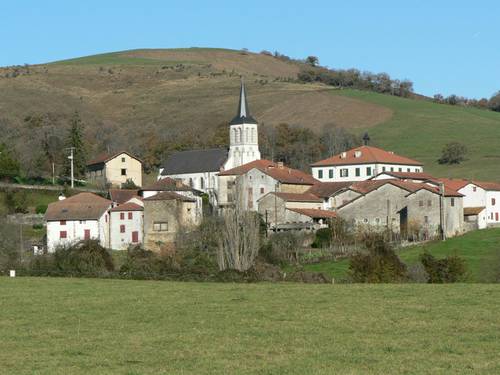 Ostabat
Ostabat
The following morning, we rose early, left the visitors’ book unsigned, crossed the mud and slop of the yard for the last time and without a single glance back headed on towards Ostabat. Six hours later we met our new hosts for the evening. This time we had opted for “chambre d’hôte” – bed & breakfast accommodation. We were shown to a very clean and tidy room with attached bathroom. There were lace curtains on the windows and a matching bedcover neatly tucked over a modest size double bed. It was a room of feminine tastes and colors; soft and fleecy. It was lovely to look at but difficult not to feel like we were messing up the décor with the grime of the day still clinging on to us. We showered and did our best to stack the contents of our backpacks in neat piles under one of the window ledges. Our hosts for the evening were a couple of Basque speaking retirees. Our dinner was, predictably, poulet basquaise - Basque chicken - and unpredictably, ruined by the rooster!
Question :
Have you ever been held hostage at someone else’s dinner party?
The dinner that night reminded me of mealtimes in winter, growing up in Christchurch, New Zealand. I hated cooked vegetables on the table by 5pm when my father got home from work. But mostly I remember the adage: children should be seen and not heard - an injunction uttered by my father presumably whenever I opened my mouth to complain. Or maybe the five-mile bike ride home from the office in a freezing easterly wind or a roaring sou’wester left him with no patience to deal with the chatter of a child. I don’t know how reliable my childhood memories are but I do know that our host in Ostabat that night triggered in me the same silent black fury. I slipped back to an age when my mother’s voice could admonish me for lack of gratitude. Her admonishment would usually begin with, “when I was your age, I never had…..” She would try to shake me out of my sulking bad temper by teasing me about my lower lip being so long that one day I would trip over it. Silent black fury born of helplessness in the presence of the all-powerful.
While my five-year-old self, was practicing voodoo rites on our domineering, self-opinionated, bigoted host, my mother’s daughter smiled politely and ate everything put in front of her – with gratitude. It was the price of the meal and the clean comfort of “home”.
At the time Richard was a journalist writing for L’Express, one of France’s major weeklies. That made him attractive to a host with a cause to promote and a culture to defend. The Basque Country has a unique history and language and has the luck or misfortune to be situated on both sides of the Spanish and French borders. For many years Basque terrorists plagued the Spanish government and the local population with bombs and shootings in an attempt to bring attention to their fight for independent rule of their territory. While culturally aligned to the cause, the French Basques had never displayed the same desperado techniques. Spanish Basques were rich and the French Basques, poor; the social security system in France was better than that in Spain so the fight had never had the same allure for the French Basques.
Our host was a Basque first and a Frenchman second. He was at home in his Basque Country but not in France. We could have shared notes on what it was like to feel like a foreigner in the land of one’s choosing but he couldn’t tolerate foreigners and certainly not one of female gender.
I noticed our hostess was incapable of wedging words into her husband’s monologue and she did not dare intervene in the dialogue conducted exclusively with “the journalist”. We women were sidelined and too polite to complain. It was another form of being held hostage. In order to keep the real or imaginary balance of exchange I accepted a bullying host.
And it was not the first time I had experienced being demeaned by a man in a social context. It is not a French specialty. I had returned to NZ via Sydney to attend an intercultural conference as a guest speaker. On the evening after the conference, I had been invited to a dinner party. I was entertaining the dozen or so people around the table with a few anecdotes from the conference and giving my opinion on cultural differences between the French and the Australians. I had been living in France for about 10 years at the time. The host interrupted me when I was in full flight to remark in an Australian drawl as thick as a dog’s turd that I had not lost my Kiwi accent. It was a major put down. It cut all further discussion and interest in what I had to say. It was as if everyone had needed to be reminded of the rules of polite and essentially male dominated, banter at a dinner table. I should have remembered that Down Under the men talked together and the women talked together but banter was the rule of thumb when the sexes came together. For the most part, women are not skilled “banterers” which means the roles of listeners, titterers and parttime contributors tend to be what they excel at. I had stood out like a tall poppy and it had been time to cut me down to size - the Australian way. It hurt me. It insulted me. No one could appreciate what a delight it was to me to be speaking about things that interested me and, visibly, others in my own language. No one could understand the terrible pain of acculturation I went through my first few years in France after the glamor of being a tourist in Paris had worn off. No one could understand either that French etiquette meant that whoever had something interesting to impart was listened to regardless of gender. I was just as helpless as I had felt as a five-year old eating dinner at the family table. Silent black fury!
Question :
How did you handle it?
But back to the rooster and his “poule” – chick.
Richard and I discovered that this was the kind of risk one took when staying with local people. There was romance in slipping momentarily into someone’s life, sharing a snippet of it and then, sliding away the following day. There was a silent contract that all parties unconsciously agreed to for 24 hours or less. It was, however, a little like Russian roulette. That night in Ostabat I got the bullet in the head. No one died but I did not readily see a way around the problem. Being a guest at someone else’s table prevented me from expressing my thoughts and feelings for fear of being rude. The usual option open to women in these types of situations is to cluster together and start conversations that bypass the men but our hostess that evening seemed content or condemned to serve the chicken with piperade rather than engage in any conversation on the side with me. My initial silent black fury dwindled into sheer dull grey boredom and I left the table without making any attempt at a smile. In the space of two nights, we had been treated to a shyster and then a domineering bigot. I made a quiet vow to avoid, where possible, renewing this kind of contract elsewhere. I hoped the following night in Saint Jean Pied de Port would be nothing but clean and peaceful; that we would pay the price announced at the door; that there would be no hidden extras.
Episode 13 : Derrière les rideaux de dentelle, un coq
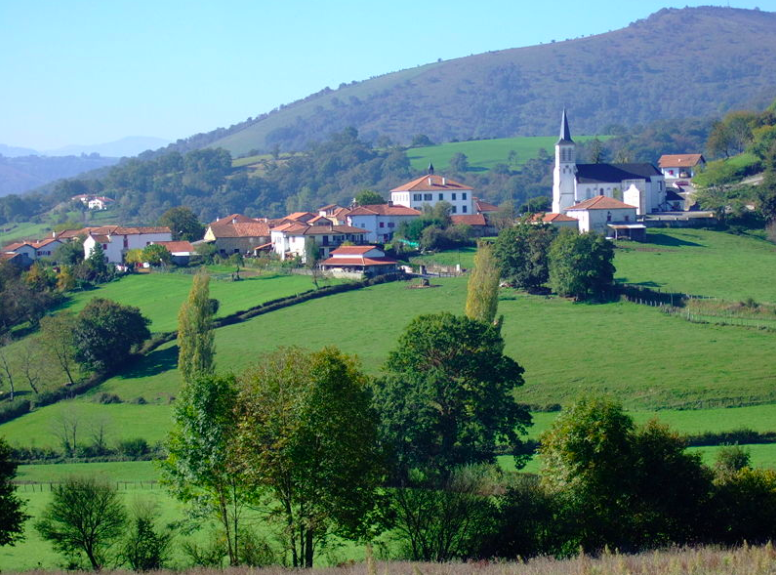 Ostabat
Ostabat
Une chambre propre, bien rangée avec salle de bains attenante - rideaux en dentelle et couvre-lit assorti. Féminin. Hôtes: un couple de retraités parlant aussi basque. Dîner: poulet basquaise gâché par le chant du coq !
Le dîner m’a rappelé l’heure des repas d’hiver, en grandissant à Christchurch, en Nouvelle-Zélande. Je détestais les légumes cuits posés sur la table à 17 h pour quand mon père rentrait du travail. Mais je me souviens surtout de l’adage: les enfants devraient être vus et non entendus - une injonction prononcée par mon père à peu près chaque fois que j’ouvrais la bouche pour me plaindre. Je ne sais pas à quel point mes souvenirs d’enfance sont fiables, mais je sais que notre hôte à Ostabat ce soir-là a déclenché en moi la même fureur silencieuse noire. Je suis remonté dans le temps jusqu’à cet âge où la voix de ma mère m’admonestait pour mon manque de gratitude et me taquiner de faire une tête longue de six pieds, lourde et qui ne tiendrait bientôt plus sur mes épaules. Fureur silencieuse noire.
Question :
Vous êtes-vous déjà senti victime d’intimidation?
Alors que mon moi de 5 ans pratiquait sur notre hôte dominateur, borné et imbu de lui-même des rites vaudou, en bonne fille la fille de sa mère, je souriais poliment en mangeant tout ce qui lui était présenté. C’était le prix à payer pour le repas et le confort propret d’être « à la maison ».
À l’époque, Richard était journaliste pour l’un des principaux titres de la presse hebdomadaire française. Attrayant pour un hôte avec une cause à promouvoir, une culture à défendre. Il était chez lui dans son Pays Basque mais pas en France. Nous aurions pu partager nos réflexions sur ce que c’était que de se sentir un étranger dans le pays de son choix, mais visiblement il ne pouvait pas davantage tolérer les étrangers et certainement pas ceux de l’autre sexe.
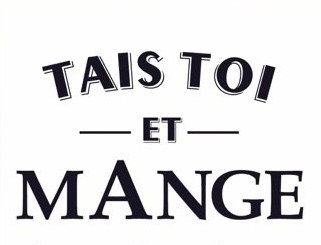 J’observais que notre hôtesse était incapable de s’immiscer dans le monologue de son mari et quelle n’osait pas davantage intervenir dans le dialogue mené exclusivement avec mon partenaire. Nous, les femmes, étions mises à l’écart et trop polies pour nous plaindre. C’était une autre forme de prise d’otage. Afin de garder l’équilibre - réel ou imaginaire - de l’échange, j’acceptai cet hôte d’intimidateur.
J’observais que notre hôtesse était incapable de s’immiscer dans le monologue de son mari et quelle n’osait pas davantage intervenir dans le dialogue mené exclusivement avec mon partenaire. Nous, les femmes, étions mises à l’écart et trop polies pour nous plaindre. C’était une autre forme de prise d’otage. Afin de garder l’équilibre - réel ou imaginaire - de l’échange, j’acceptai cet hôte d’intimidateur.
Question :
Comment avez-vous fait face à cela?
Nous avons découvert, mon partenaire et moi, que c’était le genre de risque que l’on prend en séjournant avec les habitants du cru. Il y a là cet aspect, romancé, de se glisser momentanément dans la vie de quelqu’un, de partager un moment pour ensuite s’éloigner le lendemain. Il y a une sorte de contrat tacite entre toutes les parties qui acceptent inconsciemment de le signer pour 24 heures ou moins. C’est un peu comme à la roulette russe. Ce soir là, à Ostabat, j’ai reçu la balle dans la tête. Personne n’est mort, mais c’était la dernière fois que je fus prête à avaler ma soupe sans être entendu - et à mes conditions!
_________________________________________________________________
Episode 14 : An Achilles heel
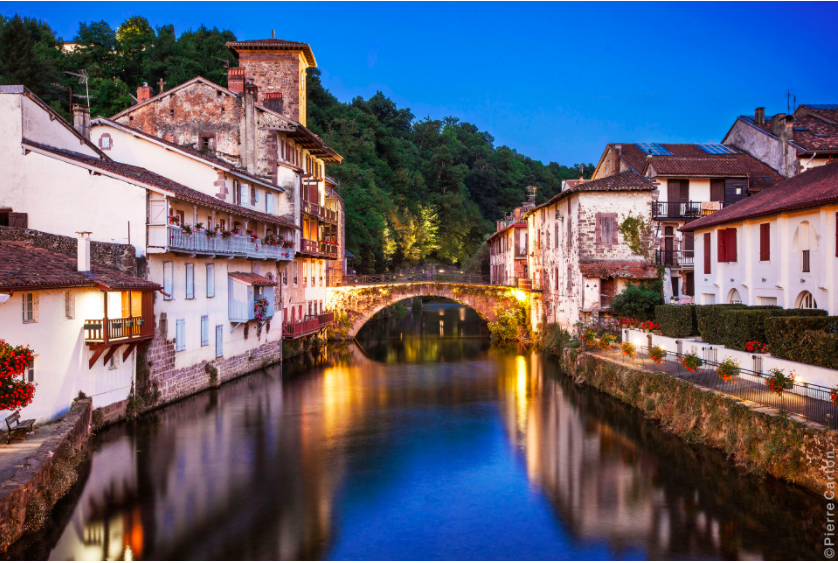 Saint Jean Pied de Port
Saint Jean Pied de Port
A further 6 hours walk the following day took us to Saint Jean Pied de Port at the foot of the Pyrenees. The walk was beautiful and uneventful. It was the arrival at the portal to the medieval town that was exciting. It was a sunny day and there were bubbles of people of all nationalities thronging the central aisle of the old town. When we reached the portal, we stopped to savour the moment. I leaned against one of its arches just to feel the coolness of the stone and to get a sense of the portentous nature of the moment. I was thinking about the number of pilgrims who had passed through this gateway on their way over the mountains. I felt weary from the 6 hours of walking but I also felt a sense of awe at being a part of a 1000 years of history. I felt proud of what we had achieved so far and, at the same time, felt humbled by the insignificance of our place in the story of the Way. While I was engaged in these musings, I looked up and noticed people were taking photos of us. I felt a bit silly until I realized we had been recognized as pilgrims. The scallop shell dangling at the back of each of our backpacks were dead giveaways as were our clothes and, just possibly, our smell! They were dressed like day trippers in shorts, T shirts and thongs. I stepped out of my daydreaming and stepped into the part being offered me by their reverent glances and snapshots. I became that pilgrim they were imagining and smiled graciously, adjusting my pose and lolling albeit, elegantly, against the portal: a weary traveller taking time out from her pilgriming. I don’t know what their cameras captured of this moment nor what they were really thinking but the photo that I have kept is of two people looking mightily pleased with themselves, surrounded by a group of gawping tourists.
We enjoyed a day in the old town just wandering the streets without the weight of a backpack. The stalls of craftsmen selling their various wares lined the main street. Apart from the clothes they were wearing I could easily imagine that the scene hadn’t changed that much since the Middle Ages. Looking down to the bottom of the main street I could see the portal we had walked through and been photographed at the day before. Looking up the street I could see the portal through which we would need to pass to begin our climb up towards the mountain pass. I was enjoying wandering from stall to stall admiring all sorts of handicraft, most of which I could not carry on my back, when some beautifully hand tooled leather goods caught my eye. I found a soft leather tan belt with a simple silver buckle. It was one knuckle wide and rolled easily around my wrist. It was relatively thick and unadorned. It would last a lifetime and I would be unlikely to hand it on to the op shop. I could choose to either carry it or wear it immediately. I bought it without further thought.
It was the 22nd of August and this was the last leg for us that summer. We would pick up the trail here the following summer. I had hoped to cross the border into Spain on this leg but Richard was suffering from tendinitis so I had to let go of my desire to keep going.
The longer I walked the Way the more addictive it became. I had begun to crave my daily fix of endorphins; those amazing hormones that allow the brain to camouflage pain and substitute it with sensations of pleasure. I had crossed a threshold after which stopping seemed much worse than going on. On the other side of the threshold, however, tendinitis was a real risk. After 3 weeks of walking between 25 to 30 kilometers a day, Richard’s Achilles was on fire and all I wanted was to shoot for another week of daily 30K fixes. He had hobbled into Saint Jean the day before and I had thought a day of rest would see him ready to move on again. After our day of sightseeing and rest I was chomping at the bit to be on the move again but Richard, whose heel was smoldering from over use had to toss in the towel. I griped and fumed but short of continuing on my own, there was nothing to be done. We were in it together and we had made a pact to stop when we could go no further. I was really peeved and struggled to sympathize with his pain, convinced it was part of a broader plan to thwart my doing what I wanted to do: continue !
Looking back, after 20 years of personal development and an awareness of family systems and how personal loyalties leave their indelible imprint on all family members, I read the peevishness as a form of unconscious loyalty towards my mother. I have been showing her how to get what she wants as far back as I can remember. And all without her ever having asked me to do so! Growing up I was witness to the following pattern: Mum says, “Let’s do X”. Dad says, “No!”. Mum asks, “Why not?”. Dad replies, “Because I don’t want to!”. The words changed but the pattern didn’t. It invariably ended in my mother’s disappointment and frustration, the clenching of my father’s jaw and a taut silence – until the next round. I must have been quite young when I made the unconsciousness decision to take on my mother’s plight as my own. My unformulated vow was, “I will realize all your dreams for you”. There are many hidden facets to such a vow: fierce determination that brooks no opposition, a willingness to go it alone, a capacity to hide emotion, parsimonious sharing of self, a wariness of anyone who could thwart my plans.......as well as a joyous relationship to life, love and friendship.......
I first screamed consciously at my father, unwittingly on her behalf, when I was 13. I told my father after dinner one summer evening that I wanted to go to Australia with a junior athletic team. He said “no”. I hit the roof and shouted I was going anyway. He actually said very quietly, “and where are you going to get the money from?”. I roared that I would work every weekend. I did. I served ice-cream every Sunday for a year and went to Australia at the end of it.
Over the years, whenever a “no” from a male partner threatened to thwart a personal desire, I learnt to reduce the heat on the inner burner before a flaming rage engulfed me. I did learn that a “no” from a man was not necessarily life threatening and could be discussed and dealt with like an adult.
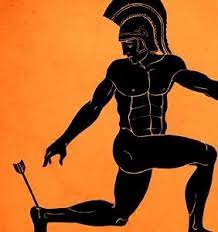
And that is what happened in Saint Jean Pied de Port when Richard said we had to stop because he had Achilles tendinitis. I did not unconsciously take up my mother’s crusade but I did feel the heat buildup around the “no” to our continuing over the mountain. I would let the flames engulf me entirely the following year.
Question:
What kind of filial loyalty drives you to do things that are not in your own best interests?
Épisode 14 : un talon d’Achille
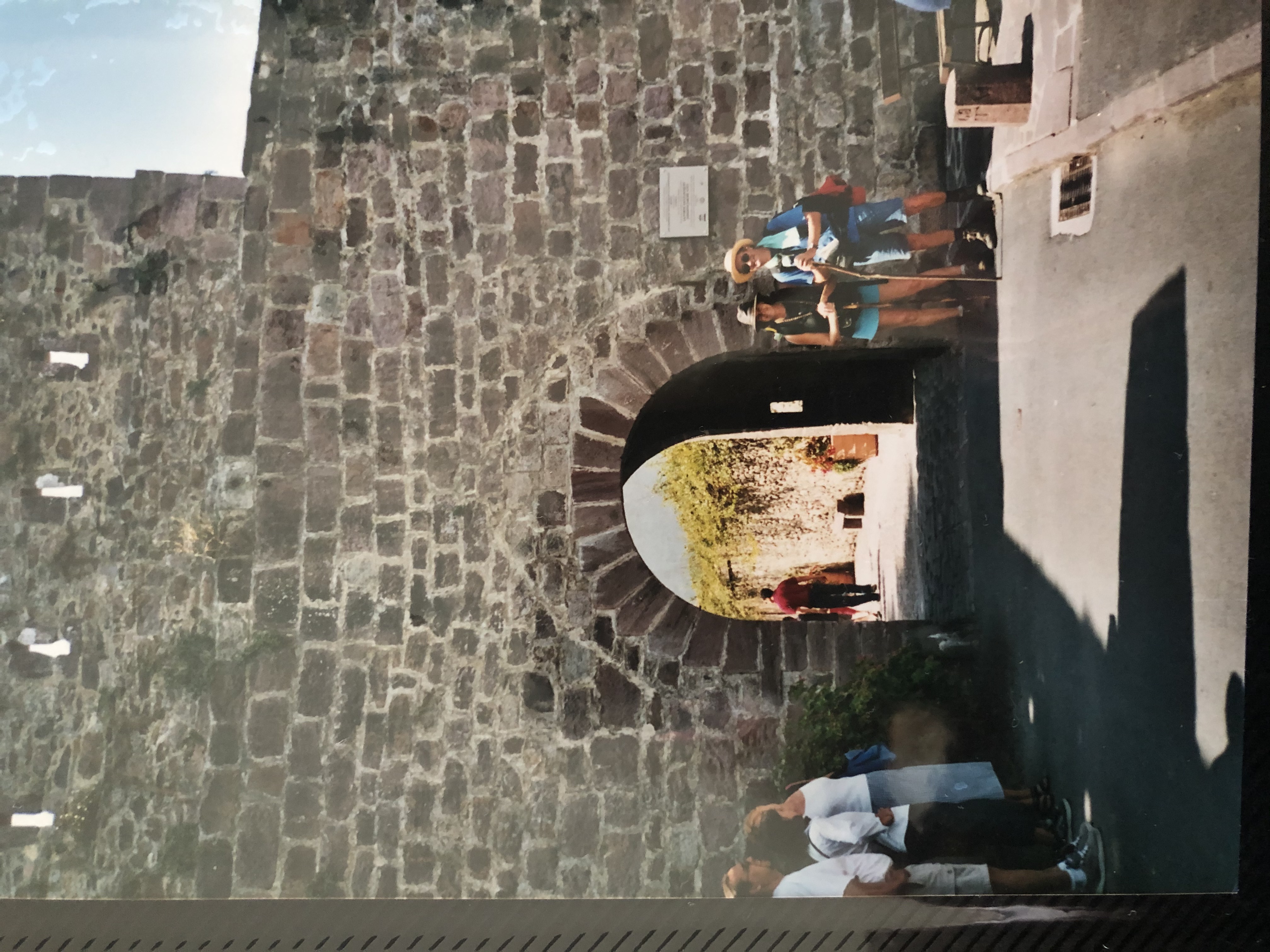 Saint Jean Pied de Port
Saint Jean Pied de Port
J’ai une photo qui montre nous deux adossés à la porte d’entrée de la vieille ville de Saint-Jean Pied de Port, au pied des Pyrénées. Je ne sais pas qui a pris la photo, mais il y a là un petit groupe de personnes rassemblées à gauche de l’entrée. Ils nous regardent avec ce que l’on pourrait imaginer être de l’admiration. Ils assistent à l’arrivée de deux pèlerins à la veille d’emprunter la passe qui les conduira au-delà des montagnes. Nous sommes rayonnants, mais je ne me souviens pas si c’est parce que leur fascination naïve prête à sourire ou tout simplement parce que nous sommes secrètement très heureux d’être arrivé jusque là. J’aurais dû me souvenir du nombre de photos prises lorsque je voyageais à travers l’Asie, de ces gens occupés à être eux-mêmes, mais j’étais alors en voyage et pas un pèlerin.
Nous avons apprécié cette journée dans la vieille ville, à juste déambuler dans les rues sans le poids d’un sac à dos. J’ai acheté une belle ceinture en cuir tannée faite par un artisan local. Je faisais ce que tout visiteur fait depuis 1000 ans ou plus: du shopping de produits locaux. C’était le 22 août et pour nous la dernière étape. Nous reprendrions le chemin ici l’été suivant. J’avais espéré traverser la frontière avec l’ Espagne en une enjambée, mais - et sans jouer sur les mots - Richard souffrait de tendinite alors j’ai dû abandonner mon désir de continuer.
Plus on marche sur le Chemin, plus il devient addictif. Le corps a soif de sa dose quotidienne d’endorphines permettant au cerveau de réduire sa perception de la douleur. Il y a comme un seuil que l’on franchit et au- delà duquel s’arrêter semble bien pire que de continuer. Lorsque le cerveau s’est « shooté » à l’hormone du plaisir, camouflant la douleur, la tendinite est un risque réel pour le marcheur après des jours de surutilisation de ses jambes.
Après 3 semaines de marche a raison de 25 à 30 kilomètres par jour c’était exactement la situation: moi, accrochée à obtenir une dose de plus et Richard avec son talon d’Achille criant « stop, assez ! »
J’étais plus qu’irritée d’avoir à m’arrêter avant que de le vouloir.
En regardant 20 ans en arrière, j’ai lu dans ce registre ronchonnant comme une forme de loyauté inconsciente envers ma mère. Aussi loin que je m’en souvienne et sans qu’elle ne m’ait jamais demandé de le faire, j’ai pris sa défense. Apprenant à survivre à leur impuissance, à leur dette de vie, les enfants manifestent leur amour de manière étrange et cachée. En grandissant, je fus témoin du registre suivant: Maman dit : « Faisons ça ». Papa dit: « Non! ». Maman demande: « Pourquoi pas ? ». Papa répond: « Parce que je ne veux pas! ».
Parfois les mots changeaient, mais pas la nature de l’échange. Cela se termine par la déception et la frustration de ma mère et la mâchoire crispée dans le silence de mon père. Je devais être très jeune quand j’ai pris la décision, inconsciemment, de considérer que le sort de ma mère était le mien. Mon vœu, bien que non formulé verbalement, était: « Je réaliserai tous tes rêves pour toi ».
Il y a beaucoup de facettes cachées dans un tel vœu : une détermination farouche qui ne tolère aucune opposition, la volonté d’aller seule de l’avant, la capacité de dissimuler ses émotions, un partage parcimonieux de soi, la méfiance de quiconque pourrait contrecarrer mes plans....... ainsi qu’une relation joyeuse à la vie, à l’amour et à l’amitié .......
Question :
Qu’est-ce qui « chauffe » votre système?
J’ai d’abord crié consciemment contre mon père, sans savoir que c’était en son nom à elle, quand j’avais 13 ans. Un soir d’été, après diner, j’ai annoncé à mon père que je voulais aller en Australie avec une équipe de jeunes sportifs. Il a dit « non ». J’étais folle de rage, criant que j’irais de toute façon. Très tranquillement il a répondu :« et où vas-tu trouver l’argent ? ». J’ai rugi que je travaillerais tous les week-ends et c’est ainsi que j’ai servi des crèmes glacées tous les dimanches pendant un an pour finalement aller en Australie à la fin de l’année.
Au fil des ans, chaque fois qu’un «non » d’un partenaire masculin menaçait de contrecarrer un désir personnel, j’ai appris à réguler mon thermostat interne avant qu’une rage dévastatrice ne m’engloutisse. J’ai appris que le « non » d’un partenaire homme n’était pas nécessairement le signe d’un danger de mort et pouvait être discuté, approché en adulte.
Q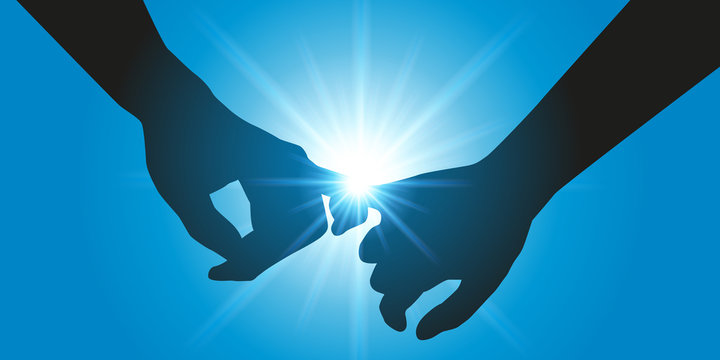 uestion :
uestion :
À qui pourriez-vous être inconsciemment loyal ?
Et c’est ce qui s’est passé à Saint Jean Pied de Port quand Richard a dit que nous devions arrêter parce qu’il avait une tendinite. Je n’ai pas, inconsciemment, repris la croisade de ma mère, mais j’ai senti la chaleur s’accumuler autour du « non » à la poursuite du Chemin dans la montagne. Je laisserais les flammes m’engloutir entièrement l’année suivante .




